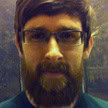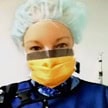-
Asked by Chris to Jonathan, Kellie, Kevin, Melissa, Stephanie on 26 Apr 2016.0
Question: Do you guys hope for certain conclusions in your projects?
- Keywords:
-
Jonathan Jackson answered on 26 Apr 2016:
I definitely hope for certain conclusions in my experiments and projects. I would *love* to see that there is a very clear pattern of brain changes in the years leading up to a diagnosis of Alzheimer’s disease. If we could identify this pattern, we could give people medicine before they ever have memory or thinking problems.
That said, it is not likely to go quite that smoothly. Brains are complicated, older adults are complicated, and older adult brains are very very complicated. As a scientist I may have to accept that my ideas just may not work out. I can only hope that I am able to accept the results and data I get, and adjust my new ideas accordingly. That’s the great thing about science – when it’s done properly, it points you to the truth, rather than just what you hope is true.
-
Kevin Baker answered on 26 Apr 2016:
Science is a very interesting process, we are always asking questions. We can form a hypothesis from these questions and test it. It is good to think of a hypothesis as a question you want answered; this question should be based off of observations you have seen. But we can never “prove” our hypothesis is correct. We can only test our hypothesis. If I set out to “prove” my hypothesis I am going to always be thinking about why my hypothesis turned out wrong. It is like telling myself, “I know this will work, and if it does not work, I must have done something wrong”. Sometimes my hypothesis is wrong, but that means I have one less thing to test now.
I do hope for certain conclusions, it is difficult not to do that! But I also understand that if my hypothesis was wrong, I still have tons of other things to test. It is like the process of elimination. One hypothesis failed to explain something, so what about the next?
-
Stephanie Moon answered on 26 Apr 2016:
I think that generally scientists hope to see certain things happen, and it’s nice when a hypothesis is supported by evidence that you gather in the lab. But we always need to stick to that evidence and interpret it based on what the data supports. I think what Jonathan and Kevin have said makes a lot of sense, and that it’s important for us to stick with what we observe (and not what we hope to observe) to make progress.
-
Melissa Wilson Sayres answered on 26 Apr 2016:
I try to set up experiments where it is interesting whether my hypothesis was supported, or whether my hypothesis was not supported. This is the way I think the best science happens – setting up scenarios where we learn new information no matter how the experiment turned out.
-
Kellie Jaremko answered on 27 Apr 2016:
I’d love to see that ketamine (a specific pain medication) helps patients after surgery. However, if my data does not show that this is true I can start looking for other medications that may work better. Like all the other scientists said we always design our studies to answer a hypothesis (what we think is happening) but it is important not to ignore other possibilities when they come up in our data.






Comments